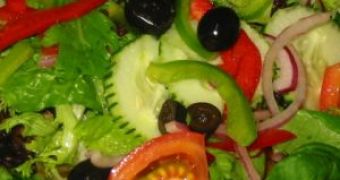A team of experts from the UCLA/Louisiana State University looked at the nutritional value of salad and raw vegetables and how the vitamins and nutrients in these natural foods are absorbed into our bodies. The findings published in the September edition of the Journal of the American Dietetic Association show that there are no reasons to worry about the fact that the high content of nutritive ingredients in raw veggies are not properly absorbed into the blood stream.
The research found that both men and women who consume salad and raw vegetables regularly fulfill their bodies' needs for vitamins and other nutritional compounds. The team found that raw vegetables are overloaded with the antioxidant vitamins C and E, folic acid, lycopene and alpha and betacarotene.
Vitamin C and E are powerful antioxidants and this is why they are also known as the antioxidant vitamins. These vitamins are at all costs needed for maintaining all the body cells healthy, because they prevent molecular DNA being damaged by free radicals.
Vitamin C also contributes to the iron absorption in the organic system and increases the immunity to infections. On the other hand, vitamin E contributes to a healthy circulatory system, as it prevents extra blood clotting and also speeds up wound healing.
Folic acid is a B vitamin. B vitamins help forming the red blood-cells and are also powerful antioxidants. They contribute to the good functioning of the brain and nervous coordination, to the emotional balance, encourage antibodies forming and increase the immunity to infections.
Lycopene is a plant pigment usually occurring in red fruits and vegetables. It belongs to the carotenoid family of pigments, which help improving short and long term memory, protect from and prevent heart disorders and some types of cancer. It is extremely beneficial against prostate and testicle cancer and prevents skin, cervical and breast cancer. Besides the antioxidant properties, lycopene is also a detoxifier of the waste in the body and inhibits cholesterol formation.
Beta-carotene belongs to a family of compounds called carotenoids, which are found in yellow, orange and red fruits and vegetables: carrots, melon, apricots, mango fruits, peaches, red peppers, but also in spinach, lettuce or broccoli. The amount of beta-carotene is directly connected to the intensity of the color of these foods. Beta-carotene protects the body from the negative effects of free radicals and the skin from the UV radiations. It slows down the aging process and helps preventing the diseases associated with old age.
For the study, scientists at the UCLA/Louisiana State University investigated dietary data from 9,406 women and 8,282 men with ages ranging from 18 to 45 and over 55 years of age. The data on their diets was comprised in the National Health and Nutrition Examination Survey III conducted in 1988-94.
"The consistently higher levels of certain nutrients in the bloodstream of salad-eaters suggest these important components of a healthy diet are being well-absorbed from salad. The findings endorse consumption of salad and raw vegetables as an effective strategy for increasing intake of important nutrients. Unfortunately, we also found daily salad consumption is not the norm in any group, and is even less prevalent among African Americans," concluded the researchers.

 14 DAY TRIAL //
14 DAY TRIAL //